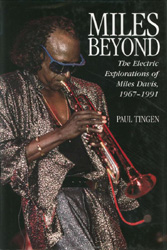
 Miles Beyond – The Electric Explorations of Miles Davis, 1967-1991 (2001)
Any connoisseur of VH-1's "Behind the Music" knows that the most captivating shit always lies in an artist's downfall, not in the period of greatest fame or creativity. It's that third segment, the one where drugs or misfortune derails 'em, wherein lies the real gold. The biographical segment, blah, the ascension segment, eh, the redemption segment, ho-hum. Gimme the unspeakable years. Most stuff I've read on Miles Davis covers the basic stuff: his East St. Louis youth, his apprenticeship with Charlie Parker, his breakout as an artist, his many artistic epiphanies, his genius, his influence, yada yada. Heretofore, no one has seemed willing to address the electric years, when he made his most powerful (and also inscrutable) music. Particularly glaring is the gloss-over given to Miles's late 1970s, when he made almost no music at all, sinking into drugs and depression. His comeback, too, is usually summarized in the same oversimplified manner of any given "Behind the Music" … he found his love of music again, attained redemption, yada yada. Miles Beyond redresses the sins of omission committed by previous literature about Miles. Paul Tingen offers an utterly fair-minded study of Davis's music and personal life, letting the story be told mostly through the words of those who were actually there. As a result, this book is the first one on Miles that seems free from hyperbole, apology, or quick dismissal. Tingen weighs all the evidence carefully, observes how the life informs the music and vice versa, and crafts his argument with crystal clarity. For the first time, light has been shed on the seemingly wayward period of Miles's life that produced many works of sheer genius along with many others that beggar comprehension. The most admirable – and surprising – thing about this book is that Tingen begins with a little about himself, stating precisely where he is coming from so as to alert the reader to look out for any personal bias creeping in. The reader is freed up to ponder it all as he or she will, without pretentious dogma or pseudo-academic "expert opinion" getting in the way. This aspect is bold and refreshing, offering an entirely fresh paradigm for music criticism – one which lets the music speak for itself, and allows the listener an unfiltered experience. It's an open-mindedness that music criticism as a whole can use a lot more of. Tingen also relies on Marshall Rosenberg's "nonviolent communication" ideals, wherein a strong reaction to any piece of music must be expressed in terms of its effect on the listener. As such, an album can't be "bad," it can only "not conform to the listener's ideals of beauty." At last, a bona fide new-age music critic … I breathe deeply in relief. Check your ego and your personal issues at the door … we can finally talk about music, meaningfully. Tingen does a simply incredible job in commenting on each phase in Miles's floaty period following the end of the second great quintet. Though most critics acknowledge the greatness and impact of the first few electric "explorations" (In a Silent Way, Bitches Brew, Jack Johnson), few have given serious consideration to anything that followed. The coolest thing about Miles Beyond is that Tingen manages not only to give equal time to each successive album, he writes in such a way that you feel like you're hearing the music. Though many passages are probably a little involved for the Miles neophyte (and perhaps impenetrable to the non-fan), there is a real propulsion to it all – the book's stops and starts are merely parallels to Miles's own. When Miles is floundering to find a sound, Tingen communicates this in his tone, simply by observing everything as it is. Ultimately this amounts to a much deeper understanding of what the hell Miles Davis was up to in the 70s and 80s than has ever before been written. I was especially surprised and pleased to find a number of crannies in Miles's career that I did not already know, including the existence of a final acoustic quintet after the big one. I did not expect to find my thirst for Miles Davis music suddenly opening up again, after so many years of listening to him. Now I have a little list of minor Holy Grails to chase down, to know even more deeply this man's music. Another huge surprise is that the book opened me up, after a good 15 years of avoiding it, to Miles's 80s era, which I'd always dismissed (sadly, like the same critics I decry) as horseshit. Tingen impeccably delineates the swirling roster of musicians that came and went through Miles's bands, allowing this era to live and breathe again as something that was, if inarguably less satisfying than what preceded it, still a vital and thriving phase that produced some damn fine music. I can't think of a music-oriented piece of nonfiction that I have found even remotely as satisfying and thrilling as this one. Usually, music biographies are fan-only affairs that offer little but untempered ejaculation. This one not only presents a clearer picture of Miles Davis, artist and man, than ever before, but it also presents a writer as worthy as his subject. I can only hope that other music writers will follow in this utterly crucial direction.
Review by La Fée |